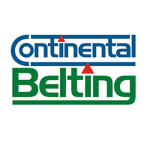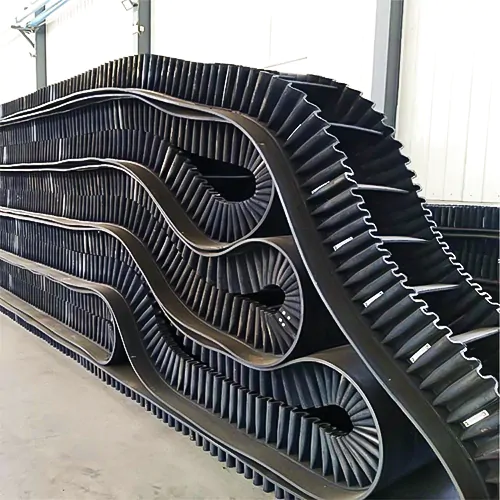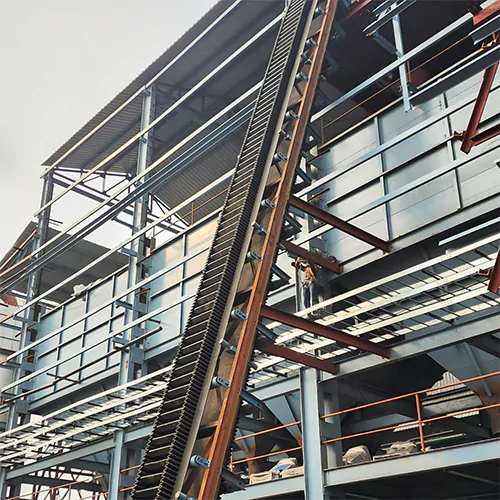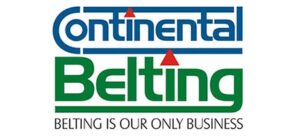A Highly Advanced Belting Solution!
Sidewall Belting
When used in high-capacity steep-angle conveying, Sidewall Conveyor Belt need to be able to handle the exceptionally high stress and the frequent bending that happens throughout the process. Because of this, the top Sidewall Belting Manufacturers In India purposefully engineer cross-stabilized base belts to deliver better stiffness values while having extremely low elongation. To ensure that the best quality polyester textiles get used in their construction. Since the late Eighties, Continental Belting has been committed to the development of World Class Sidewall Conveyor Belts, and our products are now in use on practically all the Continents. We have been instrumental in popularizing this revolutionary technology in India and overseas markets. Thereby we have become the leading Sidewall Belting Exporters. We regularly produce sidewall belts up to 1800mm in width.

Since 1984,
Operating in India



Features
Below are the detailed features of our product listed in order to provide a complete understanding!
- Flame Retardant.
- Heat Resistant to 100°C.
- Black Oil and Fat Resistant.
- High Heat Resistant to 150°C.
- Black Standard High Abrasion Resistant.
Call Us Now
(+91) 8828229262
Applications of Sidewall Conveyor Belt
Using only the greatest raw materials, we create products that serve a variety of industries.
- The belt may revolve at any angle from the feed hopper to the discharge end, even vertically. It reduces product deterioration and spills at transfer points.
- The cross cleat prevents the material from coming off the belt after it's loaded. Since the belt goes down the conveying line, it holds the load inside its own 'side skirts', minimizing spillage. More significantly, as the sidewalls are essentially part of the belt, there is no wear generally associated with side skirts. Smooth angle changes keep material inside the belt's carrying region.
- Sidewall Belting is appropriate for dockside or existing plants with limited space. With a 90-degree angle conveying, minimum ground space gets needed.
- The sidewall belt provides significant cost benefits over mechanical elevators. Reduced moving components and simple conveyor design practically eliminate expensive downtime.
- The belt can handle huge lumps, free-flowing, sensitive or fragile substances, extremely abrasive material, and lightweight or heavy loads. Our application engineers have the skills and understanding to meet your demands.
- Low power is needed to move a loaded sidewall conveyor belt. Because the system can raise at steep angles (up to 90 degrees), centre distances are minimal, and the power needed to elevate is less than in other systems. As the belt runs on spinning idlers, the low resistance creates a silent system which is beneficial while working near people. When environmental variables are essential, the system might be enclosed.
Effective Solutions
We work with your company to identify your requirements depending on your application and thus initiate our manufacturing, supplying, and exporting process.
1. ADVANTAGES OF SIDEWALL BELT
No Transfer Points
Right from the feed hopper to the discharge point, the belt is capable of turning through any angle up to a vertical line and back to horizontal. This eliminates the need for multi drives and prevents product degradation and spillage at transfer points.
Practically Zero Spillage
Once the material is loaded onto the belt it is efficiently contained between the sidewalls and is prevented by the cross cleat from falling back. As the belt travels along the conveying line it retains the load within its own ‘side skirts’, eliminating spillage, but more importantly, as the sidewalls actually form part of the belt there is none of the wear normally associated with side skirts. The smooth transition when changing angle also ensures the material remains within the belt’s effective carrying area.
Space Saving
In areas where land is at a premium, i.e. dockside, or within existing plant where space is a problem, SIDEWALL CONVEYOR BELTS provides the ideal solution. With the ability to convey material at angles up to 90 deg. the required ground space is minimal.
Minimum Maintenance – Long Belt
In cost comparisons between mechanical elevators and SIDEWALL BELT systems it has been proven that the SIDEWALL BELT has considerable advantages. The belt itself requires no maintenance and the reduced number of moving parts plus simple conveyor construction virtually eliminates costly downtime.
Wide Range of Materials can be Handled
With the extensive range of belt sizes available, the SIDEWALL CONVEYOR BELT is capable of handling almost all materials: large lumps, free flowing, delicate or fragile substances, highly abrasive material, light weight or heavy loads. Our application engineers have the experience and a thorough working knowledge to specify the system to suit your needs.
Low Power Requirement, Quiet Smooth Running
A clear advantage of using an SIDEWALL CONVEYOR BELT system is the low power required to move the loaded belt. Because the system can elevate at steep angles (up to 90 deg.), centre distances tend to be small and even in high lift applications power required to elevate is considerably less than in other systems. As the belt is running on rotating idlers, the low resistance results in a quiet system, an advantage when operating in close proximity to personnel. Where environmental factors need to be considered, the system can be totally enclosed.
2. SELECTING THE BASE BELT
Type ‘XE’
This belt incorporates the cross-stabilising ply in the tensioning ply, mainly used for medium duty applications.
Type ‘XE+2’
The cross-stabilising ply and tensioning plies are separate, in this case the belt has 2 cross-stabilising plies, application areas are medium to heavy.
Type ‘XE-SC+2’
This belt incorporates textile tensioning plies with Steelcord cross-stabilising members. The high lateral stiffness means the belt can be used in application areas where rigidity is an important factor, i.e., high lift heights and wide belts.
Type ‘XST-SC’
This belt incorporates Steelcord tensioning with Steelcord cross-stabilising members. High tensile strengths can be achieved making the belt ideal for high vertical lift applications.
3. MINIMUM PULLY DIAMETER
Belt Composition:
X = Cross-Stabilized construction.
E = Polyester Tension Plies
+2 = Number of Separate Cross-Stabilizing Plies
SC = Steel Cord Cross-Stabilized
XST-SC = Steel Cord **Belt weight will be decided by the final belt design which is dependent on the application.
4.SELECTING THE CLEATS
All S-Wall Cleats have been specifically designed to give optimum performance.
5. SELECTING THE SIDEWALL
The Sidewall design ensures maximum flexing without fatigue, the profile has excellent vertical stability for load retention and return side support. The design allows for high compression to ensure smooth inner deflection around small radii. Another important design feature is that the Sidewalls can be pressed from both sides when mounting, this offers much higher bond strengths and security.
The fabric insertion is of the diagonal type which gives excellent tear resistance and also allows the Sidewall to flex more easily.
The rubber compounds used have been tested to ensure maximum flexibility along with high abrasion resistant and high tensile strength.
Sidewalls has proved the design and rubber compounds work together in harmony increasing the life of the Sidewall and ensuring maximum durability.
Type S
Standard Construction in heights from 40mm to 120mm
Type SR
Standard construction but with Diagonal Fabric Reinforcement.
Type HDSR
Heavy duty construction including fabric reinforcement as standard in heights from 120mm to 300mm.The fabric reinforcement is of the diagonal type ensuring maximum flexibility with high vertical stability. If required these can be supplied without fabric reinforcement to special order, Ref: HDS
Type XHDSR
Heavy duty Special design including fabric reinforcement as standard in heights from 300mm to 630mm.
Rubber Qualities
- Black Standard High Abrasion Resistant
- Black Oil and Fat Resistant.
- Heat Resistant to 100°C
- High Heat Resistant to 150°C
- Flame Retardant
- Other qualities may be available to special order, please enquire
